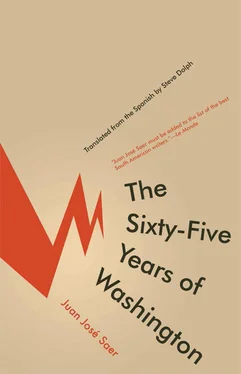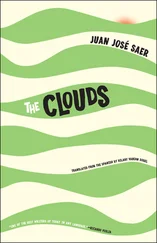Juan José Saer - The Sixty-Five Years of Washington
Здесь есть возможность читать онлайн «Juan José Saer - The Sixty-Five Years of Washington» весь текст электронной книги совершенно бесплатно (целиком полную версию без сокращений). В некоторых случаях можно слушать аудио, скачать через торрент в формате fb2 и присутствует краткое содержание. Год выпуска: 2010, Издательство: Open Letter, Жанр: Современная проза, на английском языке. Описание произведения, (предисловие) а так же отзывы посетителей доступны на портале библиотеки ЛибКат.
- Название:The Sixty-Five Years of Washington
- Автор:
- Издательство:Open Letter
- Жанр:
- Год:2010
- ISBN:нет данных
- Рейтинг книги:3 / 5. Голосов: 1
-
Избранное:Добавить в избранное
- Отзывы:
-
Ваша оценка:
- 60
- 1
- 2
- 3
- 4
- 5
The Sixty-Five Years of Washington: краткое содержание, описание и аннотация
Предлагаем к чтению аннотацию, описание, краткое содержание или предисловие (зависит от того, что написал сам автор книги «The Sixty-Five Years of Washington»). Если вы не нашли необходимую информацию о книге — напишите в комментариях, мы постараемся отыскать её.
The Sixty-Five Years of Washington — читать онлайн бесплатно полную книгу (весь текст) целиком
Ниже представлен текст книги, разбитый по страницам. Система сохранения места последней прочитанной страницы, позволяет с удобством читать онлайн бесплатно книгу «The Sixty-Five Years of Washington», без необходимости каждый раз заново искать на чём Вы остановились. Поставьте закладку, и сможете в любой момент перейти на страницу, на которой закончили чтение.
Интервал:
Закладка:
Waiting for the effect of his interjection, Washington turns a profile to the gathering and, slowly lifting his head, simulates interest in the crossbeam that supports the pitched roof over the illuminated pavilion. One or two, off guard, also raise their heads and examine the crossbeam, without seeing anything in particular, but the majority of the guests fail to demonstrate, in the seconds following Washington’s lecture, the slightest reaction, insofar as an almost ubiquitous silence, disrupted only by the sounds of utensils and plates, settles on the table. Almost ubiquitous: because just as Washington pronounces the last syllable of his interjection, Nidia Basso starts to laugh. Her laughter, suddenly welling up, you could say, under the pavilion, resonates in the surprised ears of the company, reverberates among the tops of the trees cooling in the darkness of the patio, and is finally lost, dispersing into many of the night’s different and contradictory directions, the starlit sky in particular — the starlit sky, or rather that thing above our heads, somewhat lost among the horizontal plane, that shines a neutral cover, without omnipotent or capricious or judgmental presences, the starlit sky, no? which, though no less mortal and likewise prisoner to the incessant solids and gasses, with its apparent firmness, its dimensions and its mystery, expansive and cold, annihilates us.
On the upper deck of the ferry, on the bench at the stern, the previous Saturday, Botón thought it opportune to introduce a quick digression, drawing a sharp caricature of Nidia Basso: according to Botón, whose tone of voice rises, suffused with rancorous qualifiers, Nidia Basso’s laughter does not on its own prove that the scene or the words that tie it together are comical, because in any situation, in fact, Nidia seems disposed to laugh at whatever is said, funny or not, insofar as, always according to Botón, her laughter has no connection to the outside world, and even less so with the part of the outside world composed of the words that Washington has just spoken. ( The mosquito, for example. ) What’s more, according to Botón, it would be difficult to tell if, in this specific case, it was Washington’s words or the silence after that caused it. Even though humorous rhetoric makes frequent appearances in Washington’s conversation, Botón argues savagely, the release of tame, easy, high-pitched laughter is a disproportionate response to Washington’s subtle irony, which should probably leave you thoughtful and could, at the most, make you smile, inwardly more than anything, unlike, for example, Tomatis’s vulgar, cheap cracks, or El Gato, whose supposed sense of humor consists in mocking the person who’s speaking. Listening to him, with his gaze constantly fixed on the spot on the river where the ferry’s wake starts to dissipate, the Mathematician suspects that, with the pretext of defining Nidia Basso’s peculiar laughter, Botón is exploiting the opportunity, for some unknown reason, to slander El Gato and Tomatis, but while he recounts Botón’s distinctions to Leto, in his own words, he omits, though he feels them again, his suspicions. If it were the words, the Mathematician says, then according to Botón it would mean a simple lack of subtlety in perceiving, behind the superficial irony, the gravity always apparent in Washington’s words (or vice versa), but if it was caused by the silence, one’s hypothesis would have to incline toward nervous laughter, less a sign of the comedy of the world than of neurasthenia in the issuing subject, Botón qualifies with postmodernist taste. Botón thinks that, in fact, if you were to attempt a general classification of distinct types of laughter relative to the circumstances that provoke it, you would realize that the overwhelming majority have little or nothing to do with humor. This is the case with Nidia Basso’s laughter. Botón says he never saw her laugh about something that was actually comical, or he didn’t notice, or doesn’t remember — in any case, laughter caused by something comical wouldn’t be, in Nidia Basso’s case, anything but a simple exception, a flash of real connection to the world, a fleeting moment of inattention to the incessant and anxious narcissism that suppresses her subjective laughter.
Is Botón capable of this sort of interpretation? The Mathematician asks himself this while he talks, without looking at his companion, and responds without hesitating: In his opinion, no. Among various possibilities for the source of the digression he considers two: either Botón heard a similar explanation from a third party, Tomatis, or Pichón Garay, or Silvia Cohen, or was present for a conversation between them and is appropriating, in a parasitic way, their ideas, or maybe he, the Mathematician, has been framing, to the extent that Botón was relating unadorned scenes in a linear way, the way he presents Leto with Botón’s words as if Botón were recalling a riddle in which the Mathematician heard the solution but not the terms that compose it. But there is a third possibility that the Mathematician, as an impartial rationalist, does not discard: flatly rejecting that Botón could be the author of the interpretation, he could concede that Botón, in good faith, has forgotten that it belongs to Silvia Cohen, or to Beatriz, or Pichón Garay and, thinking it his own, repeats it without realizing this, so that when he, the Mathematician, no? opts for the second possibility, where he claims the interpretation as his own, his situation becomes similar to Botón’s, though more acute, because by attributing to himself the interpretation that Botón ignores having taken from Silvia Cohen, let’s say, the Mathematician in turn repeats Silvia Cohen’s terms, leaving the event in question with so little reality that the value of the interpretation itself is made problematic.
— So, the Mathematician says, to Washington, what is confused in people and horses is clarified by observing the mosquito.
— The mosquito, Leto repeats.
— The mosquito, right, says the Mathematician.
— The mosquito, Leto repeats again, assuming a reflexive intonation.
— The mosquito, the mosquito, the Mathematician says, shaking his head affirmatively.
Their pace, now well-harmonized, is neither slow nor fast, more regular than ever, as if it had taken their legs, their entire bodies, several blocks to find the common rhythm that surrounds them, transforming them into a kind of machine that regulates the differences between their two bodies and calibrates their proportions to obtain a common output. From the outside, the rhythm is so regular it appears deliberate — from the outside, no? And yet you couldn’t find two people who were more different than these two: the athletic and rational rugby-man, picture perfect from a physical standpoint, dressed completely in white, including the moccasins he bought that August in Florence, whose father, a liberal yrigoyenista lawyer is, nevertheless, the owner of a majority of the farms surrounding Tostado, the Mathematician, as I was saying, no? fond, for some reason, of swimming in the colorless river of premises, of propositions, of postulates, and to whom Tomatis — who gave him the nickname — claims those same premises, propositions, and postulates give a sick satisfaction, something that Leto, to tell the truth, has never been able to verify, and which could be more about Tomatis’s intent, using the Mathematician as a pretext, to slander the exact sciences in general. And the other, Leto, Ángel Leto, no? skinny, his legs a little crooked, much smaller and younger, slightly myopic, whose shirt and whose pants, of three or four times poorer quality than the other’s white outfit, combine less elegantly, Leto, who has lived less than a year in the city, which he came to following Isabel, his mother, who fled the evidence of a suicide like it was a worldwide catastrophe, Leto, who keeps, for a living, several accounts, and who that morning, for reasons as inexplicable as those inclining the Mathematician toward syllogisms and theorems, instead of going to work, decided to get off the bus and start walking down San Martín to the south. Impossible to be more different, although something, in spite of it all, equalizes them — and not just them, no? the identity that’s generic to individuals of the same species, individuals who, after all, speak the same language and, though they come from different cities, were born in the same country and even the same province and therefore possess common fragments of experience — no, nothing like that, which of course is their own and shared with their co-provincials, their so-called compatriots, their countrymen — no, nothing like that, but rather something more particular and at the same time less definite, an impression, a feeling they both carry deep down inside themselves — and never suspecting that the other, or others, also feel it gives it a particular tint and above all reinforces it, the feeling, I mean, of not completely belonging to this world, or, as a result, to anyone else, of never being able to perfectly fit the internal to the external or vice versa, and no matter how hard they try they will always find thin gaps between themselves and everything else, something which, for obscure reasons, they blame themselves for, a feeling so confusing and inconsistently applied that it is confused for thought and for flesh, where the self is the stain, the error, the asymmetry that with its solitary, ridiculous presence clouds the radiant body of the universe. Now, as well, since they began walking down the straight street together, along the shady sidewalk, a new, impalpable tie binds them: the false memories of a place neither of them has seen, of events neither witnessed, and people neither have met, of a day at the end of winter that is not inscribed on their experience but which stands out, intensely, in their memory, the illuminated pavilion, the encounter between El Gato and Botón at the School of Fine Arts, Noca coming from the coast with his baskets of fish, the stumbling horse, Cohen turning the coals, Beatriz constantly rolling a cigarette, the golden beer with a white head of foam, Basso and Botón picking vegetables at the back, shadows moving confusingly as darkness falls, and which, without it being clear how, and above all why, are swallowed by the night.
Читать дальшеИнтервал:
Закладка:
Похожие книги на «The Sixty-Five Years of Washington»
Представляем Вашему вниманию похожие книги на «The Sixty-Five Years of Washington» списком для выбора. Мы отобрали схожую по названию и смыслу литературу в надежде предоставить читателям больше вариантов отыскать новые, интересные, ещё непрочитанные произведения.
Обсуждение, отзывы о книге «The Sixty-Five Years of Washington» и просто собственные мнения читателей. Оставьте ваши комментарии, напишите, что Вы думаете о произведении, его смысле или главных героях. Укажите что конкретно понравилось, а что нет, и почему Вы так считаете.












